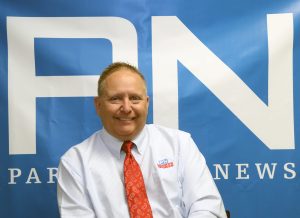Remembering Naval aviator, Michael Burns
By Tom Fjerstad/Editor
Inspiration is a word that gets tossed around quite often in our circles — from the athletic accomplishments at the recent National Veterans Wheelchair Games to the never-quit attitude of countless Paralyzed Veterans of America (PVA) members who have fought for and secured much in the way of equality for those of us with disabilities. But I would like to pay homage to one of the great men in our organization who has been truly inspirational to many.
Naval aviator Michael Burns retired from the service after incurring a spinal-cord injury (SCI) in 1968. Michael found himself in the SCI unit at the Department of Veterans Affairs (VA) Long Beach Healthcare System.
It would have been as impossible then as it would be now not to become familiar with PVA while rehabbing at this facility. Michael soon became president of the PVA California Chapter, but that was just the beginning. In 1970, then-PVA National President Carlos Rodriguez appointed Michael as the PVA national executive director in Washington, D.C.
The list of accomplishments during his tenure as executive director were great, but none were more important than his efforts in securing PVA’s federal charter from Congress. In the September 1971 issue of PN magazine, Michael had this to say in his monthly column:
“The Federal Charter for the Paralyzed Veterans of America was at last approved. Twenty-five years of dedicated service has now been recognized. The passage is a singular tribute to all of those who have dedicated themselves to the PVA cause. All share in this momentous moment in our history. All should be proud. With this recognition comes the end of our protracted ‘adolescence.’
“Congress considers us grown up now and we must act it. Everyone, from those of us in Washington, to the directors and service officers and board members of the chapters, must look upon their role within PVA with a new light and a new responsibility. All the talk of what we would do if we had recognition can now be put aside. We have it. Now we must prove that we were worthy of their trust and respect. We must now talk of what we will do now that we have attained this goal. It will be a time of change. A time of transition to new programs and broader goals. We must all face the challenge. We must stand ready to prove that we deserved it.”
It’s this charter that permits PVA to represent veterans with their claims before the VA and the U.S. Court of Appeals for Veterans Claims. Michael resigned his position as PVA executive director in April 1972, but he soon found himself back on Capitol Hill.
Shortly after leaving PVA, Michael started working as a professional U.S. Senate staff member. He was the first disabled Vietnam combat veteran to be employed by the Senate. Michael worked on numerous committees and helped draft a number of significant legislative initiatives, including the Rehabilitation Act of 1973, the federal statute on which the Americans with Disabilities Act is based.
He also spent time working for the late Sen. Alan Cranston (D-Calif.), who chaired the Senate Committee on Veterans’ Affairs. This allowed Michael to work on significant pieces of legislation that directly affected PVA members.
Leaving Washington, D.C., in 1985, Michael accepted a position as the first administrative officer at the San Diego VA Spinal Cord Injuries and Disorders Center. After serving in a variety of positions in San Diego, Michael retired in 2001 — if you want to call writing four books, logging 250,000 miles in a recreational vehicle and working as a speech writer and a consultant “retiring.”
I was saddened to learn that we lost Michael in June. It’s a loss not just for PVA but for all veterans with disabilities.
Former PVA National President Richard Johnson was one of Michael’s friends and said Michael “cared about our cause. He didn’t just talk about it, he went out and did something about it. I always took some joy in knowing he was out there.”
Over the last several months, I’d been telling myself to go over to San Diego to introduce myself to Michael and say thank you. Hindsight is always 20/20.
Don’t find yourself regretting the fact you didn’t make the time to reach out and say thank you to those who’ve made a difference in your life; tomorrow may simply be too late.


